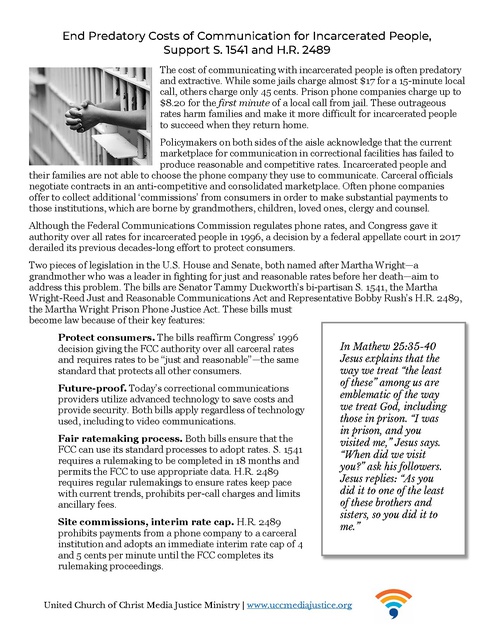End Predatory Costs of Communication for Incarcerated People 11-10-21
Download original document:

Document text

Document text
This text is machine-read, and may contain errors. Check the original document to verify accuracy.
End Predatory Costs of Communication for Incarcerated People, Support S. 1541 and H.R. 2489 The cost of communicating with incarcerated people is often predatory and extractive. While some jails charge almost $17 for a 15-minute local call, others charge only 45 cents. Prison phone companies charge up to $8.20 for the first minute of a local call from jail. These outrageous rates harm families and make it more difficult for incarcerated people to succeed when they return home. Policymakers on both sides of the aisle acknowledge that the current marketplace for communication in correctional facilities has failed to produce reasonable and competitive rates. Incarcerated people and their families are not able to choose the phone company they use to communicate. Carceral officials negotiate contracts in an anti-competitive and consolidated marketplace. Often phone companies offer to collect additional ‘commissions’ from consumers in order to make substantial payments to those institutions, which are borne by grandmothers, children, loved ones, clergy and counsel. Although the Federal Communications Commission regulates phone rates, and Congress gave it authority over all rates for incarcerated people in 1996, a decision by a federal appellate court in 2017 derailed its previous decades-long effort to protect consumers. Two pieces of legislation in the U.S. House and Senate, both named after Martha Wright—a grandmother who was a leader in fighting for just and reasonable rates before her death—aim to address this problem. The bills are Senator Tammy Duckworth’s bi-partisan S. 1541, the Martha Wright-Reed Just and Reasonable Communications Act and Representative Bobby Rush’s H.R. 2489, the Martha Wright Prison Phone Justice Act. These bills must become law because of their key features: Protect consumers. The bills reaffirm Congress’ 1996 decision giving the FCC authority over all carceral rates and requires rates to be “just and reasonable”—the same standard that protects all other consumers. Future-proof. Today’s correctional communications providers utilize advanced technology to save costs and provide security. Both bills apply regardless of technology used, including to video communications. Fair ratemaking process. Both bills ensure that the FCC can use its standard processes to adopt rates. S. 1541 requires a rulemaking to be completed in 18 months and permits the FCC to use appropriate data. H.R. 2489 requires regular rulemakings to ensure rates keep pace with current trends, prohibits per-call charges and limits ancillary fees. Site commissions, interim rate cap. H.R. 2489 prohibits payments from a phone company to a carceral institution and adopts an immediate interim rate cap of 4 and 5 cents per minute until the FCC completes its rulemaking proceedings. In Mathew 25:35-40 Jesus explains that the way we treat “the least of these” among us are emblematic of the way we treat God, including those in prison. “I was in prison, and you visited me,” Jesus says. “When did we visit you?” ask his followers. Jesus replies: “As you did it to one of the least of these brothers and sisters, so you did it to me.” United Church of Christ Media Justice Ministry | www.uccmediajustice.org

